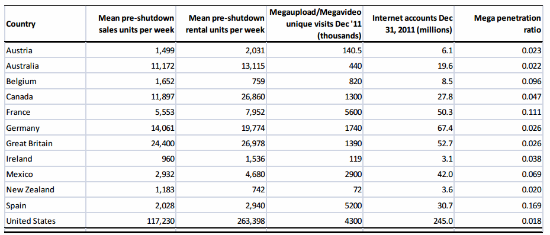In what is becoming one of the strangest, most unbelievable and over-broad farces in the history of United States copyright trolling, the ante has just been upped yet again. In a direct attack on the troll defense blogs FightCopyrightTrolls and DieTrollDie, Prenda Law has just ordered WordPress to hand over all IP addresses of users who accessed either site in the last two years. Just to be clear, that’s everyone’s details.

Copyright trolls, wherever they try to do business in the world, meet resistance.
Their work is appreciated by few outside of their inner circle and often frowned upon by fellow law firms, copyright owners and the public, who see their work as one step away from outright extortion.
While they have enemies everywhere, some of the trolls’ greatest adversaries are their victims. Once you’ve threatened to turn someone’s life upside down with a claim for thousands of dollars, pounds or euros, relationships aren’t really the same ever again. And an enemy empowered by the Internet, one of the greatest game levelers today, soon gets momentum.
In the United States some of the most motivated troll fighters are to be found on two sites,
FightCopyrightTrolls and
DieTrollDie. Their aims are simple. To keep the public and fellow victims informed and to ensure that through activism, trolls make as little money as possible.
Needless to say, trolls do not like this kind of opposition. It hurts their bottom line. And now, in the middle of what is probably the most bizarre case there has ever been in troll history, one outfit is coming out fighting – possibly for its life.
Prenda Law is in the middle of a mess so massive that to adequately describe the case in enough detail one needs to write many thousands of words. Fortunately, for those who want to catch up, the sites mentioned above have been keeping up to date,
complimented brilliantly by Techdirt’s Mike Masnick and Ken’s excellent summary over at
Popehat.
The TL;DR is that there is going to be an unprecedented showdown in a Los Angeles court on Monday that could lead to someone associated with Prenda going to prison.
“Based on the evidence presented at the March 11, 2013 hearing, the Court will consider whether sanctions [for Prenda Law] are appropriate, and if so, determine the proper punishment. This may include a monetary fine, incarceration, or other sanctions sufficient to deter future misconduct,” Judge Wright explained.
But while the blood of trolls may indeed flow on Monday, in the last few days Prenda have been going on the offensive.
Earlier this week FightCopyrightTrolls and DieTrollDie had a nasty surprise. Prenda decided to file
three defamation lawsuits which according to FCT’s SophisticatedJaneDoe are “designed to chill free speech by burying [Prenda's] critics in massive legal fees.”
Two of the targets in the lawsuit are people involved in the proceedings due to go ahead on Monday, but also listed were a total of 10 John Does. So who are these mysterious characters?
Well, none other than the operators of DieTrollDie (DTD), FightCopyrightTrolls (FCT) and commenters on their sites. The beef? Seems Prenda
don’t like criticism, or ‘defamation’ as they prefer to frame it.
On Wednesday, one of the cases – John Steele v. Paul Godfread, Alan Cooper and Does 1-10, FLSD 13-cv-20744 – was
dismissed without prejudice by John Steele. The other two remain. Then yesterday, more surprising news.
It transpires that Prenda Law have
sought information about DTD’s and FCT’s readers and commenters from WordPress, and not just the odd detail either.
“Dear Custodian of Records,” the Prenda subpoena to WordPress begins.
“Enclosed, please find a subpoena issued in the above-referenced matter, which is currently pending in the Circuit Court of the Twentieth Judicial St. Clair Couty, Illinois.
Our client is requesting all Internet Protocol addresses (including the date and time of that access in Universal Coordinated Time) that accessed the blogs located at diretrolldie.com and fightcopyrighttrolls.com between January 1, 2011 through the present.
Please provide this information in an Excel spreadsheet.”
That’s right, somehow Prenda want *everyone’s details*, whether they are involved in the lawsuit or not. DTD hope that WordPress won’t comply but are preparing their readers for the worst.
“As there is a possibility that a release could occur, the public IP address (date/time stamp) could fall into the hands of Prenda. I would expect that they would then try to cross-reference the IP address with their list of alleged BitTorrent infringement IP addresses,” DTD warn.
“If you have ever gone to this site or Fightcopyrighttrolls.com since 1 January 2011, you may want to contact WordPress and tell them you want them to refuse this overly broad request and at least wait until the issue of the case being removed to the Federal court is answered, before releasing ANY information,” DTD concludes.
So, faced with organized opposition from DTD and FightCopyrightTrolls, Prenda now appear to want to shut them down and quieten the critics. History tells us it won’t work.
This attack against all readers of those sites will only add fuel to the fire and serve to make the possibility of a terrible outcome for Prenda on Monday an even more delicious prospect.
 Like many other copyright holders Fox isn’t pleased that their content is being shared for free on The Pirate Bay.
Like many other copyright holders Fox isn’t pleased that their content is being shared for free on The Pirate Bay.

 As
As  Since 2005 the
Since 2005 the 
 This week we have four newcomers in our chart.
This week we have four newcomers in our chart. Last year a study in Sweden
Last year a study in Sweden 
 When BitTorrent was invented it solved a problem, that of shifting large amounts of data round the Internet in a speedy, efficient and reliable manner.
When BitTorrent was invented it solved a problem, that of shifting large amounts of data round the Internet in a speedy, efficient and reliable manner. Last week the six-strikes anti-piracy system was launched by the
Last week the six-strikes anti-piracy system was launched by the  It is no secret that the MPAA was one of the instigators of the Megaupload investigation, which ultimately led to the shutdown of the company January last year.
It is no secret that the MPAA was one of the instigators of the Megaupload investigation, which ultimately led to the shutdown of the company January last year.
 In June 2012 the police search and seizure raids against Kim Dotcom and other alleged members of the so-called ‘Mega Conspiracy’ were deemed to have been carried out illegally.
In June 2012 the police search and seizure raids against Kim Dotcom and other alleged members of the so-called ‘Mega Conspiracy’ were deemed to have been carried out illegally.
